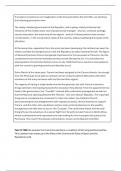If we place ourselves in our imagination at the time just before the Civil War, we will have
the following panoramic view.
The newly installed government of the Republic, with a policy clearly limited by the
influence of the middle class, has imposed social changes - divorce, universal suffrage,
secular education, the autonomy of the regions - and all of these policies have caused
consternation. in the conservative ranks of the country, without satisfying the hopes of the
left either.
At the same time, opposition from the army has been developing: the military has seen the
need to combat the dangerous turn that the Republic has taken towards the left. The figure
of General Francisco Franco has gained importance for his successes in Morocco; but his
companions know that he hesitates and has not yet decided to act. It is only when the
assassination of José Calvo Sotelo occurs in July 1936 that Franco seems to lose patience
with the country's growing anarchy and decides to act.
Since March of the same year, Franco had been assigned to the Canary Islands, far enough
from the Peninsula to be able to maintain secret contacts without difficulties with other
members of the army and even with the German Nazi regime.
The urgency of having a single leader worried the generals; but with Franco's decision,
things seemed to be heading towards the resolution they desired. From his appointment as
head of the government, the “Caudillo” (named after nationalist propaganda) worked so
that the National Uprising defeated the 'Marxist', 'red' and 'atheist' Republic. The important
thing was to coordinate the movement to 'save' the nation: the Catholic Church,
demonstrating its total disagreement with republican policy, did not hesitate to support
Franco, and the other anti-republican sectors such as the landowners or the wealthy
bourgeoisie took little time to join in. the 'Crusade'. The cards were drawn and the only
thing left was the adventure of a secret flight from Tenerife to take Franco to North Africa,
where a professional and seasoned army was waiting for him to prepare the jump to the
Peninsula. The result? The bloody confrontation, known as the Spanish Civil War.
Feb 16 1936 the popular front wins the elections; a coalition of left-wing political parties.
This coalition was made up of the likes of the Communist Party of Spain and the
Republican Left.
, Jul 13 1936 death of José Calvo Sotelo - a prominent politician and leader of the opposition
to the government of the second republic, known for his right-wing and anti-republican
positions. He was kidnapped and later murdered by a group of police officers who acted by
order of the republican government.
Jul 17 1936 attempted coup d'état by generals such as Franco, Emilio Mola and Sanjurjo,
supported by conservative forces, the Catholic Church, Italy, and Germany.
The cautious conspiracy ends
General Franco's coup d'état was the result of the growing alarm experienced by the right
in Spain; With the changes introduced by the Republic, panic spread in the Church and its
alliance with Franco was not unexpected. Franco was a cautious conspirator, but, after
deciding to join the rebellion against the government, he was considered a natural leader
and received the support of other elements committed to the uprising. The fact that he had
key experience in leading his troops in combat represented a considerable advantage over
the Republican forces - without training and, for the most part, without a military career.
Sep 9 1936 first session in London of the Non-Intervention committee, to establish the
terms of an international agreement to avoid foreign intervention in the conflict.
Oct 1 1936 Franco was named generalissimo, with absolute control over the military and
political forces of the national side, and allowed him to exercise power over all of Spain.
Spain divided
The civil war broke out when the parties and sympathizers of the right believed that it was
essential to put an end to the Republic: the events of 1936, when groups of day laborers
illegally occupied several large estates, set off the alarms of the landowners and the
radicalization of the left ended up awakening the fears of the Church and the right in
general. Only the army could overthrow the Republic and when the plot of several generals
turned into an uprising there would be no turning back. Francisco Franco, who had waited
until the last moment to act irrevocably, arrived in Morocco from the Canary Islands (where
the Republic had incomprehensibly assigned him) and upon moving to the Peninsula the
Uprising gained pace.




